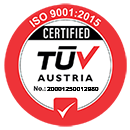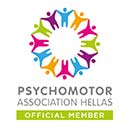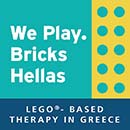Through Psychomotor Therapy, the child acquires
physical and mental “flexibility”.
Psychomotor Therapy
Psychomotor Therapy has many common elements with Occupational Therapy.
It is applied in many countries in north and central Europe such as Belgium, Germany, The Netherlands, etc. It addresses children and adolescents with a wide range of difficulties: motor difficulties such as developmental coordination disorder and motor immaturity, cognitive problems, such as learning difficulties and attention deficit hyperactivity disorder (ADHD), emotional problems such as anxiety, phobias, depression and eating disorders as well as sensory, psycho-social and behavioral problems.
The testing tools used by Psychomotor Therapists to evaluate a child’s difficulties in these areas are internationally recognized and are identical to the tools used by Occupational Therapists as well. They include, for example: Bruininks-Oseretsky Test of Motor Proficiency, Second Edition (BOT-2) for motor development, Beery-Buktenica Developmental Test of Visual –Motor Integration, Sixth Edition (Beery VMI) for visual-motor integration, and Physical Self-Description Questionnaire (PSDQ) for physical self-esteem.
The areas that a Psychomotor Therapist evaluates are:
- Gross motor skills
- Fine motor and graphomotor skills
- Body posture
- Balance
- Manual dexterity
- Visual-motor integration
- Bilateral coordination
- Space perception-orientation
- Auditory perception
- Organization in space and time
- Concentration
- Body scheme/self- image
- Social skills
Psychomotor Athens™ has specialized personnel with master diplomas in Psychomotor Therapy from KU Leuven, Belgium.
Contact us
210 8 100 508









